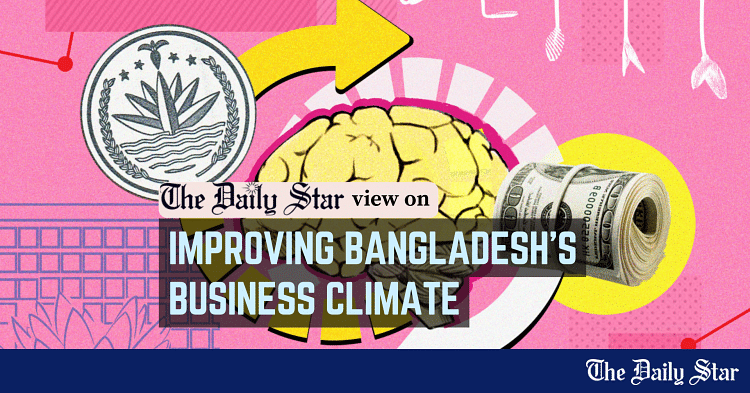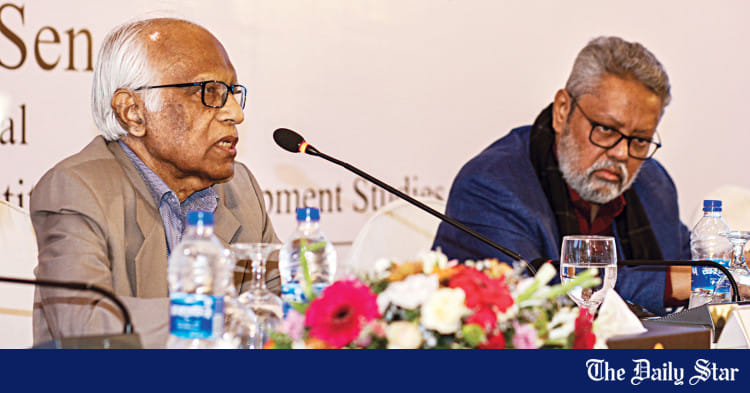Saif
Senior Member
- Joined
- Jan 24, 2024
- Messages
- 16,880
- Likes
- 8,153
- Nation

- Residence

- Axis Group


Govt must improve law and order fast
Improving law and order has become imperative in recovering Bangladesh’s global image that took a beating for domestic politics over the past decade, said a top chamber leader.
Govt must improve law and order fast
Says president of AmCham

Syed Ershad Ahmed
Improving law and order has become imperative in recovering Bangladesh's global image that took a beating for domestic politics over the past decade, said a top chamber leader.
"Due to political instability and corruption, there has been significant damage to Bangladesh's reputation globally -- we need to work on rebuilding trust with international partners," Syed Ershad Ahmed, president of the American Chamber of Commerce in Bangladesh, told The Daily Star in an interview recently.
Factors such as law and order and political instability discourage foreign investors.
To attract foreign direct investment, demonstrable evidence of an improving business climate and transparent governance needs to be presented, he said.
Ahmed's observation comes at a time when Bangladesh's net FDI was found to have been overstated by $5.7 billion between fiscal years 2019-20 and 2022-23.
In the four fiscal years, Bangladesh actually received $5.86 billion as net FDI, a disappointing amount given the seeming political stability and stellar economic growth in those years.
Ahmed termed the last 10 years of the previous Awami League government "very pathetic".
"What I think is that our institutions were severely damaged in those years."
Institutions like the Public Service Commission and the Election Commission and the regulatory agencies such as the National Board of Revenue (NBR), the Bangladesh Bank (BB) and the police were compromised.
"This led to widespread disorder in the country and everything became politicised."
The previous AL regime saw widespread corruption and money laundering.
"The Anti-Corruption Commission and the Bangladesh Bank were supposed to foil those but they did not do their job."
Even the agencies meant to support businesses such as the port were not spared from politicisation, which, ultimately, weakened the business environment, and the business ecosystem suffered.
"If the ACC is not truly independent and effective, corruption will continue unchecked. Similarly, our Public Service Commission needs to ensure a fair recruitment process free from political influence. Only then we can build the foundation for sustainable economic growth."
Institutional reform is key, said Ahmed, country manager and managing director of Expeditors (Bangladesh), a global logistics company.
"We need strong, independent institutions that aren't swayed by political pressure or financial incentives. Without strong institutions, our business environment will continue to suffer," he said, while lauding the interim government's reform initiatives.
And all the institutions should be led by strong, impartial individuals who are not money-minded.
"Only then can we create a truly democratic atmosphere. The challenges we are facing, like cronyism and the politicisation of business organisations, are deep-rooted. And these issues won't just go away without structural changes."
Bangladesh's politicians practised the wrong sort of politics all these years, according to Ahmed.
They were supposed to pick politicians as leaders. Instead, they invited businesspeople to politics and made them ministers.
For instance, in January, two-thirds of the lawmakers elected in the 12th parliamentary election were business people, according to Shushasoner Jonno Nagorik, a non-government organisation.
"So, we made a big mistake here. Because politicians are supposed to be individuals who are connected with the people, those who have the tendency to sacrifice for people. What we saw was that those who became councillors were engaged in business also."
Parties should pick those people as leaders who have the mentality to serve the people and do not have the mentality to expand their wealth.
While businesspeople have the right to engage in politics, they should distance themselves from businesses when they become active in politics.
"When you are a politician, your focus should be on politics. But if you are involved in politics and business, there will be no benefit."
He cited the case of the US where successful businesspeople who join politics step aside from their businesses. They leave the businesses to the top management of their firms.
"Here, in our country, you will find that the politicians remain involved in their business directly. This should not be."
Some businesspeople had political aspirations, and they joined politics after becoming leaders of trade bodies such as the Federation of Bangladesh Chambers of Commerce and Industry.
"This is a regret for us. Had the trade bodies worked in favour of businesses, then our business environment would not have deteriorated so much."
Says president of AmCham
Syed Ershad Ahmed
Improving law and order has become imperative in recovering Bangladesh's global image that took a beating for domestic politics over the past decade, said a top chamber leader.
"Due to political instability and corruption, there has been significant damage to Bangladesh's reputation globally -- we need to work on rebuilding trust with international partners," Syed Ershad Ahmed, president of the American Chamber of Commerce in Bangladesh, told The Daily Star in an interview recently.
Factors such as law and order and political instability discourage foreign investors.
To attract foreign direct investment, demonstrable evidence of an improving business climate and transparent governance needs to be presented, he said.
Ahmed's observation comes at a time when Bangladesh's net FDI was found to have been overstated by $5.7 billion between fiscal years 2019-20 and 2022-23.
In the four fiscal years, Bangladesh actually received $5.86 billion as net FDI, a disappointing amount given the seeming political stability and stellar economic growth in those years.
Ahmed termed the last 10 years of the previous Awami League government "very pathetic".
"What I think is that our institutions were severely damaged in those years."
Institutions like the Public Service Commission and the Election Commission and the regulatory agencies such as the National Board of Revenue (NBR), the Bangladesh Bank (BB) and the police were compromised.
"This led to widespread disorder in the country and everything became politicised."
The previous AL regime saw widespread corruption and money laundering.
"The Anti-Corruption Commission and the Bangladesh Bank were supposed to foil those but they did not do their job."
Even the agencies meant to support businesses such as the port were not spared from politicisation, which, ultimately, weakened the business environment, and the business ecosystem suffered.
"If the ACC is not truly independent and effective, corruption will continue unchecked. Similarly, our Public Service Commission needs to ensure a fair recruitment process free from political influence. Only then we can build the foundation for sustainable economic growth."
Institutional reform is key, said Ahmed, country manager and managing director of Expeditors (Bangladesh), a global logistics company.
"We need strong, independent institutions that aren't swayed by political pressure or financial incentives. Without strong institutions, our business environment will continue to suffer," he said, while lauding the interim government's reform initiatives.
And all the institutions should be led by strong, impartial individuals who are not money-minded.
"Only then can we create a truly democratic atmosphere. The challenges we are facing, like cronyism and the politicisation of business organisations, are deep-rooted. And these issues won't just go away without structural changes."
Bangladesh's politicians practised the wrong sort of politics all these years, according to Ahmed.
They were supposed to pick politicians as leaders. Instead, they invited businesspeople to politics and made them ministers.
For instance, in January, two-thirds of the lawmakers elected in the 12th parliamentary election were business people, according to Shushasoner Jonno Nagorik, a non-government organisation.
"So, we made a big mistake here. Because politicians are supposed to be individuals who are connected with the people, those who have the tendency to sacrifice for people. What we saw was that those who became councillors were engaged in business also."
Parties should pick those people as leaders who have the mentality to serve the people and do not have the mentality to expand their wealth.
While businesspeople have the right to engage in politics, they should distance themselves from businesses when they become active in politics.
"When you are a politician, your focus should be on politics. But if you are involved in politics and business, there will be no benefit."
He cited the case of the US where successful businesspeople who join politics step aside from their businesses. They leave the businesses to the top management of their firms.
"Here, in our country, you will find that the politicians remain involved in their business directly. This should not be."
Some businesspeople had political aspirations, and they joined politics after becoming leaders of trade bodies such as the Federation of Bangladesh Chambers of Commerce and Industry.
"This is a regret for us. Had the trade bodies worked in favour of businesses, then our business environment would not have deteriorated so much."





